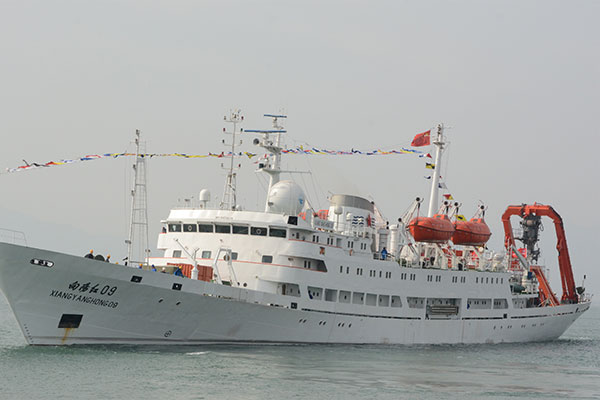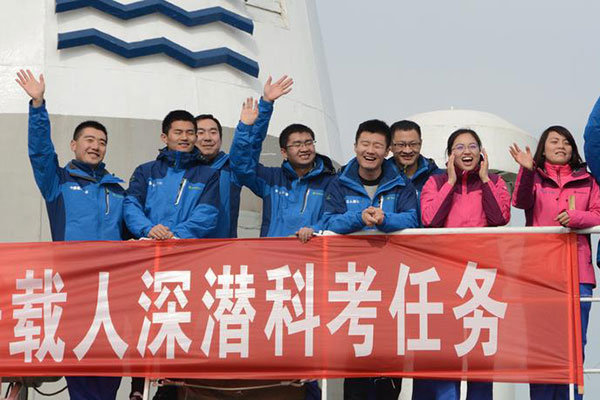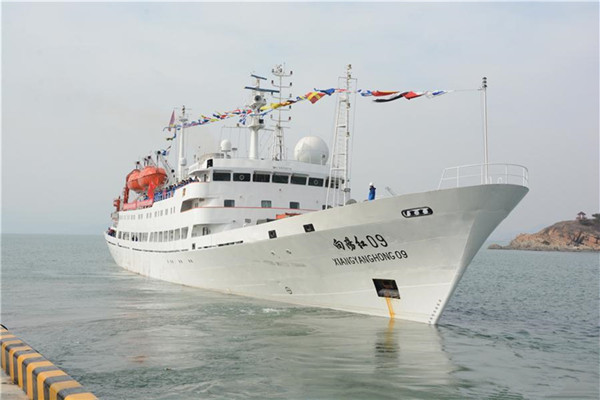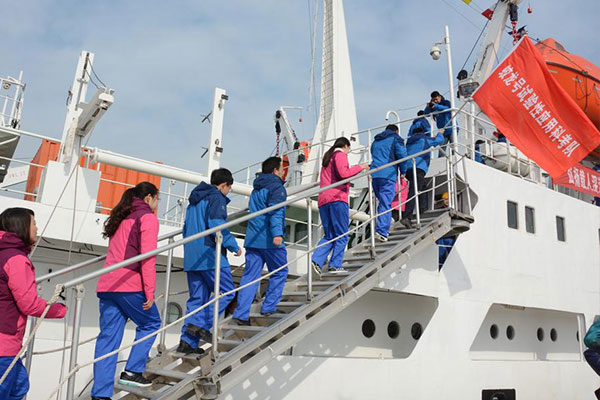
Xiangyanghong 09, carrier of China’s manned deep-sea submersible Jiaolong, sets sail from its home port in Qingdao, east China’s Shandong province, Feb 6, 2017. Jiaolong on Feb 6 started a four-month scientific expedition to the northwest Indian Ocean, the Yap Trench and the Mariana Trench. [Photo/Xinhua]

Scientific researchers wave aboard Xiangyanghong 09, carrier of China’s manned deep-sea submersible Jiaolong, at its home port in Qingdao, east China’s Shandong province, Feb 6, 2017. [Photo/Xinhua]

Xiangyanghong 09, carrier of China’s manned deep-sea submersible Jiaolong, sets sail from its home port in Qingdao, east China’s Shandong province, Feb 6, 2017. [Photo/Xinhua]

Scientific researchers go aboard Xiangyanghong 09, carrier of China’s manned deep-sea submersible Jiaolong, at its home port in Qingdao, east China’s Shandong province, Feb 6, 2017. [Photo/Xinhua]
China’s deep-sea manned submersible Jiaolong departed its home port of Qingdao, Shandong province, on Feb 6 to start its longest mission to date-a 124-day expedition.
Carried by its mother ship, Xiangyanghong 09, the submersible is scheduled to explore the northwest Indian Ocean polymetallic sulfides zone, the South China Sea, the Yap Trench and Mariana Trench in the Western Pacific during China’s 38th oceanic exploration mission, set to conclude on June 9.
Organized by the Qingdao-based National Deep Sea Center, the mission will be carried out by more than 150 researchers from about 20 scientific research institutions nationwide.
“The expedition will cover the widest range of investigation area with diversified tasks. Jiaolong will dive 31 times, including seven times below 6,000 meters,” said Yu Hongjun, director of the National Deep Sea Center.
The submersible holds China’s manned diving record, reaching a depth of 7,062 meters in the Mariana Trench in June 2012.
According to the mission plan, Jiaolong will perform a task in the northwest Indian Ocean polymetallic sulfides zone for the first time.
Covering an area of 26 hectares of land and 63 hectares of sea, the China National Deep Sea Center is a supportive station for deep sea facilities. There are only five of its kind in the world. The submersible Jiaolong moved to the center in March 2015.
Also on Feb 6, China’s other two powerful submersibles, Hailong 02 and Qianlong 01, also officially settled at the center. Hailong 02 is a remote operated vehicle that can dive to 3,500 meters with high-definition cameras, while Qianlong 01 can dive up to 6,000 meters.
“For a long time, Hailong 02 and Qianlong 01 operated separately, to the disadvantage of Chinese deep-sea exploration. Therefore, the China National Deep Sea Center will become a shared platform to bring deep-sea facilities together to enhance effective management and operation of those facilities,” said Li Bo, an official with the China Ocean Mineral Resources Research and Development Association.
